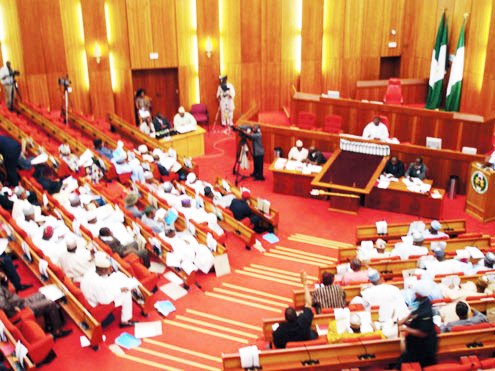POLITICS
Senate summons AGF, minister, others over e-passport deals

Senate ad hoc committee on Saturday summoned the Attorney-General of the Federation (AGF), Abubakar Malami, the Minister of Interior, Retired Lt.-Gen. Abdulrahman Dambazau and others to appear before it on April 6.
The Senate Ad Hoc Committee on Alleged Misuse, Under Remittance, and other Fraudulent Activities in Collection, Remittance and Expenditure of Internally Generated Revenue by MDAs invited the duo for briefing over their involvement in alleged e-passport deals.
The Chairman of the committee, Sen. Solomon Adeola, made this known in a statement through his Media Adviser, Chief Kayode Odunaro.
Odunaro quoted Adeola as saying “the AGF, Mr Ahmed Idris, and four private companies were invited to appear before it to brief the committee on the multi-billion-naira e-passport production.”
Adeola said they were to also explain to the committee their involvement in other immigration-related issues carried out by the companies on behalf of Nigeria Immigration Service (NIS) in a Public Private Partnership (PPP) arrangement.
According to him, the companies are Contec Nigeria Ltd, Greater Washington Nigeria Ltd, Newwork Solution and Investment Ltd, and Iris Smart Technologies.
The companies were said to be working on e-passport production, Expatriate Residence Permit and Alien Card and other immigration-related issues.
The committee chairman added that they allegedly had contractual agreements to perform some revenue generating service on behalf of NIS, while withholding certain percentage of revenue accrued to Federal Government.
He explained that the committee had invited various public officials and corporate organisations following presentation made by Comptroller General of NIS, Mohammed Babandede, on the revenue profile of the service.
The chairman further said that stakeholders were invited to brief the committee on modalities for distributing revenues running into billions of Naira among the companies, NIS and Federal Government.
He noted that “I am at a loss as to why huge part of revenue generated by NIS that should actually be based on Build, Operate and Transfer (BOT) was being paid to private firms in the name of PPP.
“We cannot be denying the Nigerian people of benefits that should accrue to them through increased revenue to government coffers, while allowing huge earnings for private concerns.
“This is an area that government can generate huge revenue. There is need to get clarifications on this issue from all the parties involved,’’ Adeola said.
Earlier in his presentation, Babandede disclosed that the reasons for entering into a PPP arrangement was due to inadequate funding and late release of budgeted sums.
He said other reasons for the partnership were multiple acquisition of travel documents and poor revenue generation.
According to him, the private partners provide all the funding, while monies realised in the course of issuing facilities will be shared with government to allow the private partners recoup their investment.
Babandede also said that for the period of investigation by the Senate between 2012 -2016, total remittance to Federal Government stood at over N17 billion and over 112 million dollars.
He said “the revenue accruing to government increased almost a hundred fold since the introduction of PPP agreements.’’
However, he said, the NIS could now undertake the services provided by the companies.
The President of the Senate, Dr Bukola Saraki, had at the inauguration of the ad hoc committee, stated that it was not set up to witch hunt any individual or organisation.
Saraki said that the essence of the committee was to help the agencies to become more prudent in the collection and spending of revenue.
He said the committee would investigate whether statutory transfers to the Consolidated Revenue Fund as required by law were being carried out accurately when due.
He noted that the move was to further stop the abuse of operating surpluses, where agencies spend `up to the last naira’ on irrelevant conferences and souvenirs.
The Senate president said that President, governors and legislators were often blamed for unfavourable economic conditions while heads of most revenue generating agencies were spared of criticisms.




























 Davido's Net Worth & Lifestyle
Davido's Net Worth & Lifestyle 
